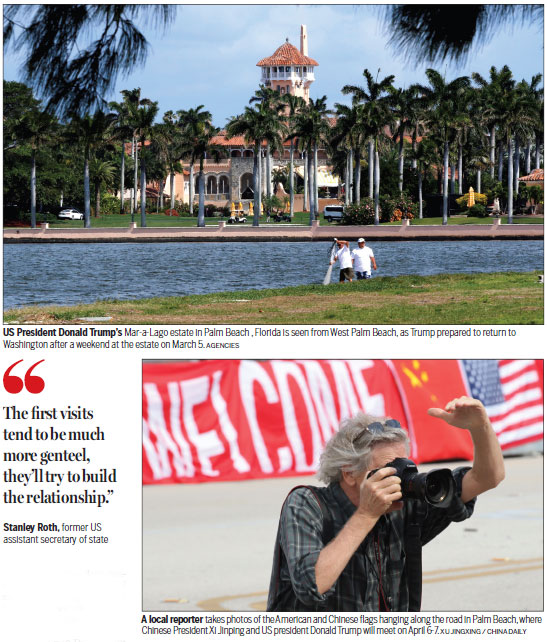Xi-Trump meeting 'a getting-to-know-you' session




Senior US officials and experts pin high hopes on the first meeting between Chinese President Xi Jinping and US President Donald Trump in Mar-a-Lago, Florida, over the coming two days.
Xi and his wife Peng Liyuan are expected to arrive in Palm Beach on Thursday afternoon for a 24-hour visit after paying a state visit to Finland.
"President Trump is an extremely gracious host. He is going to certainly seek to extend complete hospitality to his guests, Xi Jinping and Madam Peng," Matthew Pottinger, senior director for Asia at the White House National Security Council, told a press briefing on Wednesday.
Susan Thornton, acting assistant secretary of state for East Asian and Pacific affairs, said this was a chance for the two leaders to get to know one another.
"We want them to establish a good working relationship, so they can, in times of opportunity and crisis, reach out to one another and have a good rapport," she said.
She described having the meeting in Florida as a good chance for the two leaders, in a more informal atmosphere and relaxed setting, to discuss serious and important issues and to try to kick off a good relationship at the outset of the Trump administration.
She noted the roles that informal meetings and non-traditional venues have played in US-China relations, without specifying the most recent informal summit between President Xi and then US president Barack Obama at the Sunnylands retreat in California in 2013.
"A lot of our sort of relationship building has always been done at off-site type of venues, and I think we always want to have high-level engagement in the US-China relationship," she said.
"It's a very important relationship, and it's really broad and wide-ranging, and so we want to be able to establish that kind of good relationship," she added.
The US State Department protocol team and White House staff have been working with a Chinese protocol team in Florida for days, while a State Department security team is working with local police.
Thornton said the teams are making sure all local officials know what their roles are and how they can help with Trump's expectation for a successful summit. "I am sure our teams down there are going to meet that," she said.
The main focus of Secretary of State Rex Tillerson's trip to Beijing last month was to help set up and prepare for the meeting, Thornton said.
Stephen Orlins, president of the National Committee on US-China Relations, described the meeting as "very much a getting-to-know-you session."
"I hope the two look for ways on a cooperative basis to build jobs in the United States, not by closing the US market. I think ultimately that is not a winner's game. That's a loser's game," he said, referring to Trump's campaign rhetoric about the US retreating from global trade.
Orlins believes that China can help in Trump's ambitious infrastructure plan. "China has $3 trillion in US reserves. If some of that - $100 billion or something - was invested in US infrastructure, that would create jobs," he said.
Stapleton Roy, a former US ambassador to China, said he expects the summit to go well and that both sides would be trying for a positive outcome.
"We wouldn't be having the summit if the two sides didn't want it to go well, and I don't see it as that difficult to have it go reasonably well," he told a panel discussion in Washington last Friday.
Roy, who was born in China, said it would be very positive if the two leaders would establish a good relationship with each other and have the mutual confidence that they would try to work out the difficult issues in the relationship looking for a win-win outcome.
Robert Daly, director of the Kissinger Institute on China and the United States at the Wilson Center, said the more Xi and Trump meet each other, the better.
"If the two sides are able to simply signal to each other their desire to have a constructive relationship in the face of competitive pressure and they can get off the first step successfully, that's enough," he said.
Evan Medeiros, former senior director on Asia to president Obama and now a managing director for Asia at the Eurasia Group, also described the summit as about building a relationship, understanding each other and putting down a few markers on key issues.
"It is not about deliverables," he said.
"My experience is that the first visits tend to be much more genteel, they'll try to build the relationship between the two leaders," said Stanley Roth, former assistant secretary of state for East Asian and Pacific affairs from 1997 to 2001. "A lot is about atmospherics, courtesy, respect and then a few markers from each side."
Contact the writers at [email protected]





















